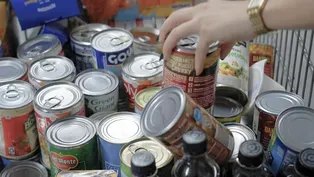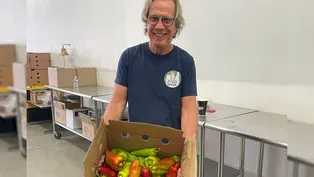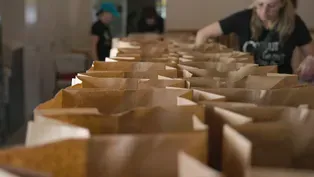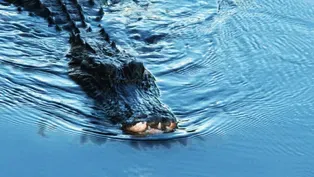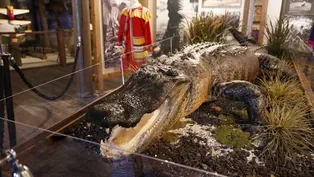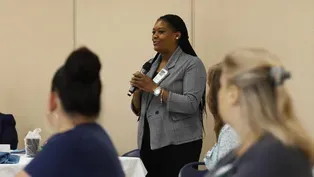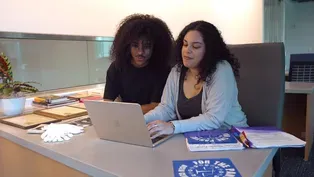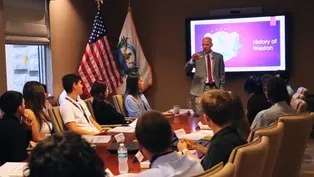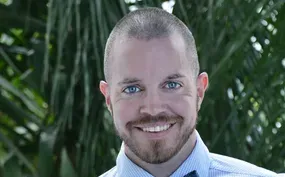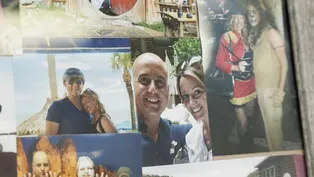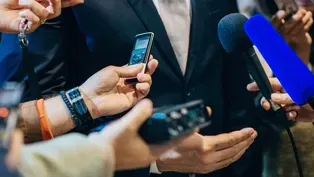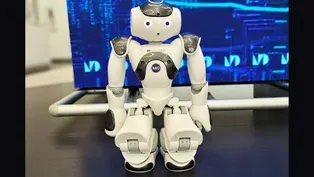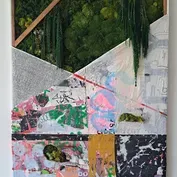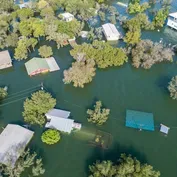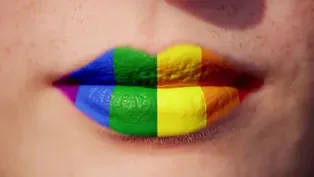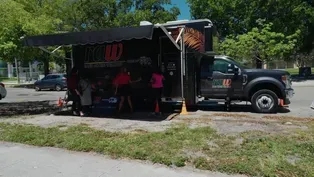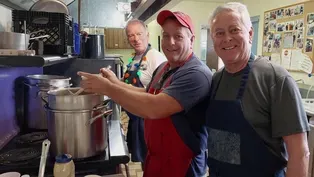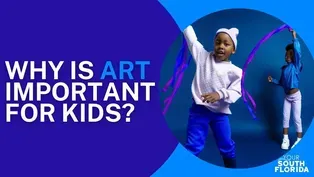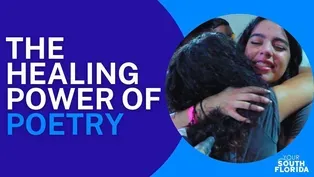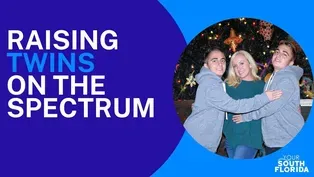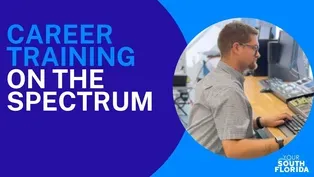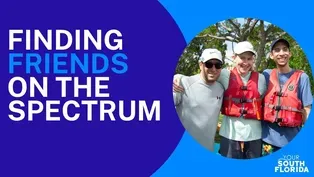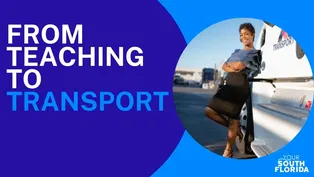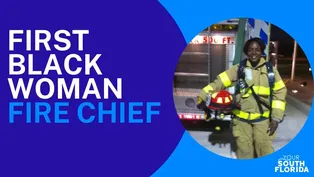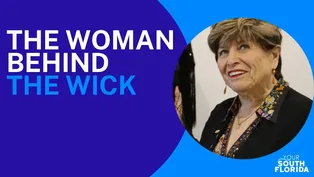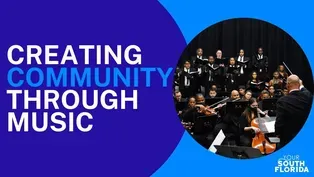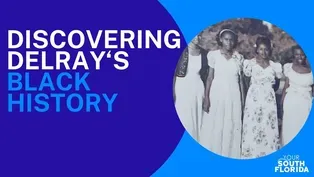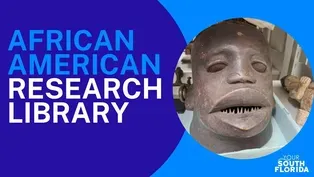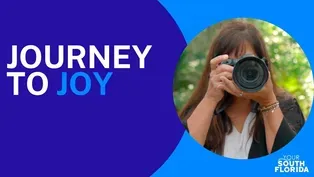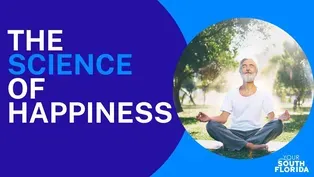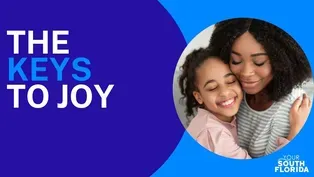Your South Florida
Happiness Coach Rob Mack on Positive Psychology & Happiness
Clip: Season 8 | 9m 37sVideo has Closed Captions
Author Robert Mack and host Arlene Borenstein discuss Positive Psychology.
Happiness Coach and author Robert Mack joins guest host Arlene Borenstein to discuss Positive Psychology, Rob's own journey to happiness, and tips to find your true happiness.
Problems with Closed Captions? Closed Captioning Feedback
Problems with Closed Captions? Closed Captioning Feedback
Your South Florida is a local public television program presented by WPBT
Your South Florida
Happiness Coach Rob Mack on Positive Psychology & Happiness
Clip: Season 8 | 9m 37sVideo has Closed Captions
Happiness Coach and author Robert Mack joins guest host Arlene Borenstein to discuss Positive Psychology, Rob's own journey to happiness, and tips to find your true happiness.
Problems with Closed Captions? Closed Captioning Feedback
How to Watch Your South Florida
Your South Florida is available to stream on pbs.org and the free PBS App, available on iPhone, Apple TV, Android TV, Android smartphones, Amazon Fire TV, Amazon Fire Tablet, Roku, Samsung Smart TV, and Vizio.
Providing Support for PBS.org
Learn Moreabout PBS online sponsorshipWith the start of a new year, many are on the quest for a reset, craving stronger connections and seeking purpose, which experts say can lead you on a path of self-discovery and ultimately happiness.
Aside from just feeling good, bringing happiness into your life has far-reaching health benefits, including a stronger immune system, less risk of cardiovascular disease, faster recovery times after illness, and may even help people live longer lives.
But with many feeling an increase in stress, anxiety, and overall poor mental health, finding true joy in life can seem like an overwhelming uphill climb.
Here with me now to share more about the science of happiness and some tips to finding your joy is Robert Mack, positive psychology practitioner.
Wow, an author of "Happiness from the Inside Out: The Art and Science of Fulfillment."
Robert, thank you for being here.
Thanks so much for having me.
I hope that by the end of this, we're gonna feel so much happier.
I hope so too.
I hope so too.
It's a good start.
It's a good start.
It's a good start.
Yes, it is, absolutely.
All right, so positive psychology is something that you see a lot these days on social media, on newscasts, all over the place, and so you are an expert.
Is this something that truly exists, truly works?
Absolutely, it's about a 20-year-old science, and it's the scientific study and science of happiness and success.
Yeah, most of business-as-usual psychology focused on mental illness, and dysfunction, and what's wrong with people.
And so positive psychology sort of came along.
Really, it's a function of the work of Martin Seligman, but it mostly focuses on mental health and wellbeing and what's right with people.
So it really focuses on sort of human strengths.
Wow, and not their challenges.
[Robert] That's right, exactly.
I love that.
So what are some misconceptions?
I know that you hear a lot of, "Always be positive," or, "Keep a positive mindset," and maybe that's not always necessarily the case.
So maybe clear some things up for us in this world of positive psychology.
You nailed it, I feel like you could teach it.
But the first misconception, I think, is the one you just spoke to, which is that most people think of positive psychology as positive thinking, or that it should be mostly or exclusively about positive thinking.
But that's not the case.
Positive psychology includes positive thinking, but it's about so much more.
It's about grit, and gratitude, and resilience, and pleasure, and purpose, and positive emotion.
And so it's about a lot of things in addition to positive thinking.
But it's not only, or mostly, and certainly not exclusively about positive thinking.
So people who may reject this idea that you can have this positive psychology part of your life, perhaps they're having a bad time.
Some simple steps that they can take that may not be like so overwhelming.
Yeah, I think start with low-hanging fruit.
So take care of your body, right?
So sleep, nutrition, exercise, stress management.
That's just basic and fundamental.
I'd start there and then I'd say I'd move on as well.
One of the things that positive psychology has shared over the years is that relationships matter.
And so focusing on social support and trying to stay socially connected is a really good thing.
It helps to make your life be better and healthier, but also helps you to live longer.
So certainly, relationships matter.
And then the other piece of it, I'd say for lots of folks, is just gratitude.
We all hear a lot about gratitude it can almost become a cliche, but gratitude does matter.
And focusing on what you most love and appreciate about yourself, others, and like itself is extraordinarily beneficial.
Purpose, living a purposeful life, that's something else you sort of promote with this idea of positive psychology.
Yeah, for sure.
I think a challenge with unhappiness is that when you become unhappy, you often dive deeper into your unhappiness and it makes you increasingly self-absorbed and self-interested.
And that could be a problem because it can make the unhappiness worse and it can make it more difficult to be and feel happy.
And so when you have a purpose or when you can at least set an intention for finding or discovering your purpose or creating your purpose, you get outside of yourself.
And when you get outside of yourself, you make it a lot easier to be happy.
That's such a good point.
Also who you have around you makes a big difference, your support system.
'Cause let's just be honest, sometimes at work, you don't get along with everybody.
Sometimes with family, especially around the holidays.
You have people at the table who you may not agree with, right?
[Robert] Yeah, that's right.
Exactly.
Especially on the holidays, that's right.
Yeah, the support system is so important.
Absolutely.
George Vaillant conducted a study a while ago, but it was the sort of the biggest and largest longitudinal study ever.
And the basic conclusion was like: relationships matter and they matter a great deal.
And so you wanna do what you can to connect with people that you care about.
And also, if there aren't people in your life currently that you feel like you care about or that care about you, try to make new connections.
Openness is good.
You don't have to be extroverted to make that happen.
But connecting with people is extraordinarily beneficial not just for your physical health, but also your psychological and emotional health.
You make so many good points.
Like, not everybody is an extrovert, you know?
And are there sort of tips or a path that you provide with your guidance to help folks who need that sort of push, that help to be more comfortable maybe around people that they don't necessarily... they're not fond of?
Yeah.
Gosh, that's a good question.
Or maybe they're not comfortable with.
Yeah, I was voted most shy of my high school class, so that question really resonates with me.
I was introverted, so the fact that- [Arlene] The shyest.
[Robert] Yes.
[Arlene] Oh, wow.
And so I'd say start where it's easy.
Start with the low-hanging fruit.
Often, that means putting yourself on what I might call like a progressive socialization training program.
That's kind of what I did with myself.
And so it's like maybe the first few days, or maybe the first week, you do the easy thing, which is just say, "Hi," to somebody new.
Every day, you make it a point to say, "Hi," to someone.
You can kinda move on after you've said, "Hi."
And the next week, you might say something like, "How are you?"
And that's it.
And then you can continue to sort of like up the ante with yourself until you become increasingly comfortable and confident saying, "Hi," and introducing yourself or connecting with people that you might not know.
Tell me about being shy.
What was your experience like that inspired you to do what you do?
You were suffering from this depression and having some really tough moments in your own life, and that's what sort of had you wanna help others.
I was deeply depressed for many, many years, and that deep depression, it went beyond sort of basic dysphoria.
It was actually, I think, severe in clinical depression and I got to a place where I was suicidal.
And I remember doing some research around suicidal means and methods.
And I had the most unpredictable, inexplicable experience ever, which is that as I dug the knife in, I felt this limit, and this love and inexpressible peace, and really this unfathomable joy, the kind of and the likes of which I had never experienced before.
And so at that moment I was like, "I'm gonna postpone the suicide for like five minutes, 10 minutes."
So in that five or 10 minutes, I started doing a different kinda research around happiness.
Like, what is happiness, and what is depression, and what is unhappiness, and what's the difference between depression and unhappiness?
And it's been a few decades, but I have to say I'm pretty surprised and inspired that we can all make the kind of changes that I made, at least with respect to happiness.
And you talk to people through what you do every day.
What would you say are some of their biggest challenges and struggles?
What's stopping them from improving their lives in this way?
And what would you say to those who wanna seek help but maybe are nervous or scared to do that?
Yeah, I'd say just a... Two things.
Nature and nurture.
So I'd say that the brain is built for survival, but not necessarily for happiness.
That's not necessarily a bad thing because if you survive in this body, it's increases the odds that you can be happy in this body.
And so I'd say the brain has a number of biases, negativity bias, confirmation bias, all kinds of biases, that serve a very productive and adaptive function, but it can also get in the way of happiness.
So just understanding that alone can be helpful.
And so what we wanna do is we wanna learn how to rewire the brain, right?
We rewire the brain by adopting and practicing very simple practices.
And they don't have to be very many.
It doesn't have to be very many.
[Arlene] Do you know a short one we can do right now?
Of course.
Let's do it.
[Robert] Let's do it.
Yes.
Okay.
It's a micro meditation.
[Arlene] Oh wow.
Okay.
Yeah, so a micro meditation is remembering- [Arlene] Look, I'm getting ready.
I know, I see you getting ready right now.
You changed your posture and everything.
I love it, I love it, a willing participant.
So the idea is to remember in not a morbid way, but remember that hopefully we have 100 years left in these beautiful human flesh costumes, right?
Maybe only a day, maybe only a minute, we don't know.
So no moment is guaranteed, so you remember that.
[Arlene] Oh, that's heavy.
It's heavy, right?
And so the idea is we wanna celebrate this one moment we have right now as deeply as humanly possible.
We can best do that by letting all our thoughts go, breathing into the nose, from the stomach, from the diaphragm.
You let your stomach expand on the inhale, you let it contract on the exhale.
And you do it with only one intention and one intention only, and then it's to enjoy that breath as deeply as humanly possible, to juice it for as much joy as you can without letting thoughts get in the way.
So it's just in through the nose.
Out of the mouth or the nose.
And the idea is you wanna practice that as often as you can throughout the day, simply for the goal or with the goal of feeling good, of enjoying it.
If you try to get good at it, you always suck.
If you try to enjoy it, you'll get good at it, but you also enjoy it, so that's the point.
Absolutely.
We invite everyone out there if they're having a hard time to do that quick meditation with us.
And it felt really good.
Good.
Yeah.
You don't think about anything else except your breath, so.
Exactly.
Yeah.
Yeah.
But you're so brave.
Thank you so much for sharing your story and doing good for others because you needed the same.
So, so wonderful to meet you, Robert Mack.
Ah, my pleasure and privilege, thanks for having me.
Support & Food for Broward Seniors and Grandfamilies in Need
Video has Closed Captions
In Broward County, many seniors are facing food insecurity. (7m 51s)
Palm Beach County Food Bank’s Critical Role in Fighting Food Insecurity
Video has Closed Captions
The PBC Food Bank works to provide nutritious meals and vital support. (9m 26s)
How Rescuing Food Supports Families & Fights Climate Change
Video has Closed Captions
Each year, millions of pounds of food are wasted while many South Floridians face hunger. (9m 57s)
Protecting the Everglades with the Miccosukee Tribe
Video has Closed Captions
For the Miccosukee Tribe, the Everglades is more than just land; it’s a vital part of their identity (8m 32s)
Inside Miccosukee Culture & History
Video has Closed Captions
Pam Giganti interviews William ‘Popeye’ Osceola and Talbert Cypress about the Tribe’s history. (11m 10s)
Transforming The Glades Through Leadership and Community Engagement
Video has Closed Captions
A program by the Belle Glade Chamber of Commerce brings people together to address community issues. (7m 16s)
How FIU Honors Mayor Ferré’s Legacy
Video has Closed Captions
FIU’s Maurice A. Ferré Institute for Civic Leadership helps to create a more engaged community. (8m 4s)
Go Inside the Program Turning High Schoolers Into Civic Game-Changers
Video has Closed Captions
The City of Weston is educating high school students about the inner workings of local government. (7m 56s)
Spotting Suicide Warning Signs: What You Need to Know to Help Someone in Crisis
Video has Closed Captions
Alan Mednick joins us in studio to share how to talk about the warning signs for suicide. (9m 18s)
From Darkness to Light: A Journey to Self-Acceptance & Mental Wellness
Video has Closed Captions
Watch the inspiring story of Caiden Smith's journey to self-Acceptance & mental wellness. (8m 13s)
Emotional Support & Resources for Loved Ones Left Behind After Suicide
Video has Closed Captions
The aftermath of a suicide can be an overwhelming and traumatic experience for those left behind. (8m 8s)
TIPS to Navigate AI Tech in Media
Video has Closed Captions
Susan Jacobson gives us her take on the role of AI in the industry and tips for students. (9m 39s)
FAU Researchers Test AI Limits & Risks
Video has Closed Captions
FAU students & researchers are using the power of AI to develop innovative ways to study the brain. (10m 13s)
Discover the Latest AI Programs @ Miami Dade College
Video has Closed Captions
Miami Dade College is diving head-first into AI with programs for all interest levels. (7m 49s)
Video has Closed Captions
Trees are vital to keeping our neighborhoods cool. (7m 7s)
Video has Closed Captions
The threat of flooding is becoming the new normal in South Florida, well outside of Hurricane Season (12m 25s)
Video has Closed Captions
As temperatures rise, it’s important to protect your pets too. (3m 40s)
Video has Closed Captions
Prolonged exposure to extreme heat poses many health risks. (4m 48s)
New Magazine Creates Stronger Community for South Florida's LGBTQ+ Women
Video has Closed Captions
Women owned SkirtSoFLo is a new magazine made for the South Florida LGBTQ+ women’s community. (6m 7s)
Mobile Units Brings Life-Saving HIV Healthcare into At-Risk Communities
Doctors from the University of Miami are creating more equitable approaches to HIV prevention & care (12m 44s)
A Beacon of Hope for Ft. Lauderdale's LGBTQ+ Community
Video has Closed Captions
For 70 years the Church of Christ Fort Lauderdale has been known for its inclusivity. (7m 2s)
How The Arts Help Child Behavior
Video has Closed Captions
Studies show that kids engaged in the arts have fewer problems interacting with others. (11m 44s)
How Poetry Can Provide Comfort and Boost Your Mood
Video has Closed Captions
Research shows that poetry can provide comfort and boost mood during periods of stress and trauma. (8m 13s)
Single Mom Gives Hope to Autism Families & TIPS to Navigate Resources l Your South Florida
Video has Closed Captions
Mom Candi Spitz knows all about the difficulties in navigating autism resources. (7m 35s)
New Higher Ed Program Gives Students with Autism a Chance at Independence l Your South Florida
Video has Closed Captions
Many adults with autism face significant barriers to finding gainful employment. (7m 27s)
Creating Safe Spaces & Friendships for Adults with Autism l Your South Florida
Video has Closed Captions
The Social Cog is creating safe spaces for young adults on the autism spectrum. (10m 51s)
Transporter Trudie Ives Talks Business & Helping Women
Video has Closed Captions
Trudie Ives discovered the world of transportation and hasn’t looked back. (9m 41s)
Fire Chief Trailblazer Samantha Whitehorne
Video has Closed Captions
Samantha Whitehorne is a fire chief for the Broward Sheriff’s Office. Watch her story. (6m 29s)
Backstage at THE WICK with Business Maven Marilynn Wick
Video has Closed Captions
Marilynn Wick has spent her life blazing a trail in the business world. (7m 43s)
Showcasing Classical Music from the African Diaspora
Video has Closed Captions
In 2021, Portia Dunkley co-founded the New Canon Chamber Collective. (11m 18s)
African American Research Library and Cultural Center
Video has Closed Captions
Take a tour of Broward County’s African American Research Library and Cultural Center. (7m 40s)
Local Photographer Shares Her Journey to Finding Joy
Video has Closed Captions
Sonya Prather set off on a journey of self-discovery that has enabled her to find true joy (7m 14s)
Happiness Coach Rob Mack on Positive Psychology & Happiness
Video has Closed Captions
Author Robert Mack and host Arlene Borenstein discuss Positive Psychology. (9m 37s)
Expert TIPS to Finding Your Joy from Author Lisa McCourt
Video has Closed Captions
Author Lisa McCourt gives tips to finding true joy in your life. (11m 11s)
Providing Support for PBS.org
Learn Moreabout PBS online sponsorshipSupport for PBS provided by:
Your South Florida is a local public television program presented by WPBT
